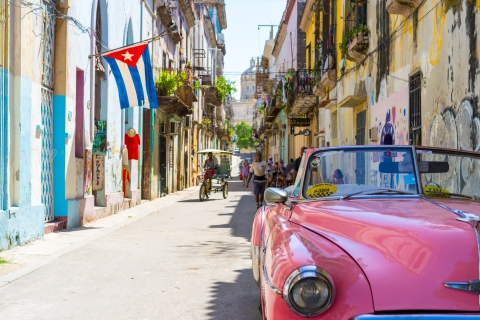The Ups and Downs of Event Planning in Cuba: A Q&A with MAD Event Management

You could say the team members behind MAD Event Management are masters of creativity. Based in Warwick, New York, they’re owners and operators of several large pop culture conventions, from Long Beach Comic Expo to C3: Comic Creator Conference. As such, they’re frequently managing events that involve large numbers of attendees dressed in costume, as well as in-depth education sessions designed to help high-level comics creatives learn and grow in the industry.
Yet for its latest challenge, MAD stepped into a similar, yet different role in a new location: Havana, Cuba. Working with the Ministry of Education of the Republic of Cuba and the Palace of Conventions in Havana, they were responsible for developing the speaker program for the 2019 Pedagogia Congress, which took place Feb. 4-8. The conference brought together several thousand educators from Latin America for what is a biennial event in Cuba.
CEN spoke with Martha Donato, president of MAD, to learn how this came about, the challenges they overcame and her advice for planners considering an event in Cuba.
Was this your first time managing an event in Cuba?
No, we produced our first event there in May 2017, so we're coming up on two years ago when we started a Comic Creator Conference there that was for creators, artists and writers. We brought people from the U.S. — Marvel Comics, DC Comics and a bunch of others — and we filled in with probably about 50 creators.
Why do that in Havana?
We first went to Cuba in summer 2016, and we met some really interesting people who were involved in the vibrant arts scene. They took us around and introduced us to some of the creatives, and we started talking about producing a full-scale comic convention. We ended up pivoting to a creator conference because the logistics were pretty challenging.
How did your work with this creator conference parlay into working with Pedagogia Congress?
We work with [Havana-based travel and entertainment company] Paradiso, and they’ve connected us with several opportunities to do other conference work. As part of those conversations, they asked if we’d bring some of our expertise to Pedagogia Congress. It was more of an exercise in connecting the dots to what we have done previously, what we might be able to do in the future and introducing what we do as a group to a new audience.
Describe the extent of your work with the latest Pedagogia event.
We provided expert speakers for them. One was Adam Healy, founder of FinTech, who spoke about how financial technology is going to be so important in the new world economy, and ways they can begin to implement learning plans around finance and technology in the coming years — think cryptocurrency and blockchain. It was very interesting; in his presentation he asked for a show of hands of how many people were familiar with those two things. Maybe five people raised their hands, out of 100. So there’s definitely a gap in terms of what they need for financial technology. As part of that, we’re going to start to produce some more conferences around the world that educate people [on this topic].
What unique challenges did Cuba present as a destination?
People talk about “Cuba time” with a wink, but that’s real. There’s a different pace of work, and everything is slow compared to what we do in New York. There are also communication difficulties. We have Spanish language interpreters, but it’s still challenging and choppy. Sometimes you think you understood something and it wasn’t their intention at all — it’s a combination of language and experience that causes that.
Any technology issues?
The internet didn’t work at all when I was there in November 2018. I had no access to Wi-Fi and cell phones didn’t work. Yet when I went back a few weeks ago it was working fine. You have to be prepared that you might have the comforts of home, or you might not.
How about hotels and meeting space?
There are a few hotels in Havana that we’re allowed to stay in as U.S. citizens. As long as you follow the rules of the state department, that piece is pretty smooth. The rooms are modern and clean. [Pedagogia Congress] was held at a modest-sized convention center with meeting space and a hotel attached, so it was very Western in feel — just at a small scale.
What advice would you give other event professionals planning in Cuba?
Make sure someone on your team is a fluent native Spanish speaker; I think that helps a great deal with the communication issues. Also, have a partner on the ground in Cuba. That’s made all the difference for us. P&G Travel handles logistics for us — they book our hotel, make sure we have our academic visas in order, book our transportation and translators and everything we need. I know some people call it a “fixer;” we don't really need a fixer. Things still can go wrong, no matter where you are in the world.
Any more events coming up in Havana?
In the fun zone for us, it’s the 500th anniversary of the city of Havana in 2019. Paradiso is managing the celebration side of that, and we’re going to produce a marathon called Havanathon with them. We’ll offer it to people in the U.S. who want to come do a full or half marathon, spend two or three nights at a hotel, and probably do some sightseeing and a party at the end. That will likely happen in early 2020, as they’re celebrating as a 14-month anniversary. Though with politics what they are, there’s always that risk factor [of cancellation] — we could be doing nothing there.


Add new comment